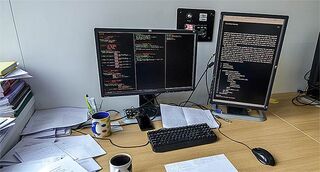Degree programme objectives
The focus of the Programming and development bachelor program is design, creation, implementation and program maintenance technology and in lesser amount also technical equipment of modern computer systems and digitally controlled systems. Graduates of the program will have fundamental understanding of the whole computer systems life cycle, starting with computer architectures, programming and software engineering, through computer networks and operating systems and ending with development of embedded systems. This technological view is supported by the necessary mathematical foundations and by introduction to design principles of secure computer systems. Important feature of the program is the focus on continuous practical verification of attained knowledge, including semestral project and semester-long internship. The goal of this program is to focus the graduates to the solving the technological (real world) problems.
Study plans
Studies
- Objectives
The focus of the Programming and development bachelor program is design, creation, implementation and program maintenance technology and in lesser amount also technical equipment of modern computer systems and digitally controlled systems. Graduates of the program will have fundamental understanding of the whole computer systems life cycle, starting with computer architectures, programming and software engineering, through computer networks and operating systems and ending with development of embedded systems. This technological view is supported by the necessary mathematical foundations and by introduction to design principles of secure computer systems. Important feature of the program is the focus on continuous practical verification of attained knowledge, including semestral project and semester-long internship. The goal of this program is to focus the graduates to the solving the technological (real world) problems.
- Learning Outcomes
After successfully completing his/her studies the graduate is able to:
- Enter the professional industry while being able to continuously adapt to new technologies.
- Work as a programmer in the full scope of the qualification, from design and implementation to deployment and maintenance.
- Work as a system administrator and system programmer.
- Work as a programmer in the signal processing and embedded systems fields.
- Work in the secure system field in any previously mentioned areas.
- Occupational Profiles of Graduates
Graduates are able to immediately work as junior programmers, designers or members of a test team with fundamentals broad enough for following professional and career growth.
- Practical Training
In the Programming and Development study programme, students complete a compulsory internship of 12 weeks/480 hours within one semester. The course is designed to introduce students to software development in practice and equip them with the knowledge and skills that a developer needs to perform his/her job on a daily or weekly basis. Information on internships can be found in the Course Catalogue, in the study materials of the course or on the website.
- Goals of Theses
The goal of Bachelor's thesis is to demonstrate that student is capable of working on a project of non-trivial size (e.g. to create a useful application or a simple information system) or to solve a non-trivial assigned problem (e.g. performance enhancement or extension of a particular program), as well as to demonstrate the capability of presentation in the textual form and comparison of the results with similar achievements. Bachelor's thesis is expected to be written in Czech, Slovak or English language. Expected structure of the work includes declaration of the author about the thesis being a school work, declaration of authorship, contents, the proper text, and references. Minimal expected scope of the work is 30 regular pages of the proper text (including illustrations).
- Access to Further Studies
Graduates are able to immediately continue in master or engineering studies of Informatics and Information Technology and related fields (e.g. computer networks), as well as programs focused on security of computer and embedded systems.


